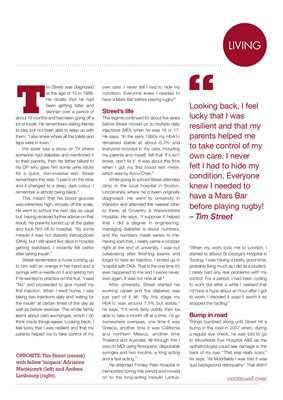
KITLIVING
OPPOSITE: Tim Street (centre)
with fellow 'loopers' Adrianna
Maciejczyk (left) and Andrea
Limbourg (right).
continued over
Looking back, I feel
lucky that I was
resilient and that my
parents helped me
to take control of my
own care. I never
felt I had to hide my
condition. Everyone
knew I needed to
have a Mars Bar
before playing rugby!
- Tim Street
"T
im Street was diagnosed
at the age of 13 in 1988.
He recalls that he had
been getting taller and
skinnier over a period of
about 18 months and had been going off a
lot of foods. He remembers visiting friends
to play but not been able to keep up with
them, "I also knew where all the toilets and
taps were in town."
His sister saw a show on TV where
someone had diabetes and mentioned it
to their parents, then his father talked to
his GP who gave him some urine sticks
for a quick, non-invasive test. Street
remembers this well, "I pee'd on the stick
and it changed to a deep, dark colour. I
remember is almost being black."
This meant that his blood glucose
was extremely high, virtually off the scale.
He went to school the next day as usual
but, having received further advice on that
result, his parents turned up at the gates
and took him off to hospital. "By some
miracle it was not diabetic ketoacidosis
(DKA), but I still spent five days in hospital
getting stabilised. I instantly felt better
after taking insulin."
Street remembers a nurse coming up
to him with an orange in her hand and a
syringe with a needle on it and asking him
if he wanted to practice on the fruit. "I said
''No'' and proceeded to give myself my
first injection. When I went home, I was
taking two injections daily and 'eating for
the insulin' at certain times of the day as
well as before exercise. The whole family
learnt about carb exchanges, which I do
think made things easier. Looking back, I
feel lucky that I was resilient and that my
parents helped me to take control of my
own care. I never felt I had to hide my
condition. Everyone knew I needed to
have a Mars Bar before playing rugby!"
Street's life
This regime continued for about five years
before Street moved on to multiple daily
injections (MDI) when he was 16 or 17.
He says, "In the early 1990s my HbA1c
remained stable at about 6.3% and
everyone involved in my care, including
my parents and myself, felt that 'if it isn't
broke, don't fix it'. It was about this time
when I got my first blood test meter,
which was by Accu-Chek."
While going to school Street attended
clinic in the local hospital in Boston,
Lincolnshire where he'd been originally
diagnosed. He went to university in
Warwick and attended the nearest clinic
to there, at Coventry & Warwickshire
Hospital. He says, "I suppose it helped
that I did a degree in engineering;
managing diabetes is about numbers,
and the numbers made sense to me.
Having said that, I nearly came a cropper
right at the end of university. I was out
celebrating after finishing exams and
forgot to take an injection; I ended up in
hospital with DKA. That is the one time it's
ever happened to me and I swore never,
ever again. It was not nice at all."
After university, Street started his
working career and the diabetes was
just part of it all. "By this stage my
HbA1c was around 7.5% but stable,"
he says, "I'd work fairly solidly then be
able to take a month off at a time. I'd go
somewhere overseas, one time it was
Greece, another time it was California
and northern Mexico, another time
Thailand and Australia. All through this I
was on MDI using Novopens, disposable
syringes and two insulins, a long acting
and a fast acting."
He attended Frimley Park Hospital in
Hampshire during this period and moved
on to the long-acting inssulin Lantus.
"When my work took me to London, I
started to attend St George's Hospital in
Tooting. I was having a pretty good time,
probably living much as I did as a student.
I rarely had any real problems with my
control. For a period, I had been cycling
to work but after a while I realised that
I'd have a hypo about an hour after I got
to work; I decided it wasn't worth it so
stopped the cycling."
Bump in road
Things bumbled along until Street hit a
bump in the road in 2007 when, during
a regular eye check, he was told to go
to Moorfields Eye Hospital A&E as the
opthalmologist could see damage in the
back of my eye. "That was really scary,"
he says. "At Moorfields I was told it was
'just background retinopathy'. That didn't